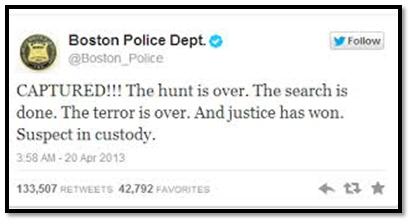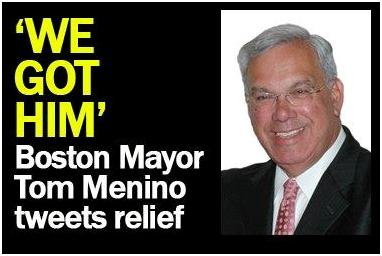Now that the Boston Marathon bombing story is ending up in the legal system, it is instructive to look back at the winners and losers in the media and technology race during last week’s big news story.
There doesn’t seem to be any question in too many people’s minds that Twitter came out of this whole thing as a key source of information and coverage. In an environment where everyone is trying to pull off “breaking news” – and many are failing – Twitter consistently led the way.
This says a lot about the changing nature of social networks as Twitter continues to distance itself from Facebook. And while Mark Zuckerberg’s baby may always be bigger in reach, Twitter is emerging as a go-to source for information (even though it was also loaded with misinformation, too).
It was also amazing to watch network reporters and anchors looking down at their phones throughout the coverage – especially the manhunt – waiting for that next tweet or text.
For those of us in radio, it’s another reminder that the guard is changing – and pretty fast. While Wednesday’s post talked about the massive reach of Facebook, Twitter needs to be acknowledged as a fast-growing source, powered by emergencies like we just witnessed in Boston.
Next week, we’ll be doing the deep dive into social media as part of our Techsurvey9 study. And we’ll be looking at social platforms beyond Facebook. As we saw in Boston, Twitter may be a very distant second in overall size, but in terms of impact, it is changing the world.
Other social media are also being employed in emergencies as well. The city of San Francisco announced that it is launching a social network website and app in order to broadcast important news and information. Obviously, the Boston situation played into this decision. It will be called SF72, and it is designed to help neighborhoods learn more about available resources in the event of an emergency, and will be integrated with Facebook and Twitter.
Does this mean that communities will bypass broadcast media in emergencies? Radio has made its case for FM chips in cellphones because of these stress moments that seem to keep erupting in communities all over the U.S. And in during a disaster where cell towers go down or fail to work, the case for broadcast radio gets a little stronger.
So we look to Boston and a new Pew Research survey that analyzed which media consumers used to find out more about the bombing and the aftermath:
Not surprisingly – faults and all – TV is on top. But digital sources are playing a greater role in people’s lives. We know that much of the way that the Tsarnaev brothers were identified was from mobile phone cameras and video recordings that were created by consumers.
It is also good to see that four in ten used radio for information.
And while at the bottom of this list, the power of social media throughout this event cannot be denied. In many ways, it was one of the big stories because whether you personally used Facebook, Twitter, or other social media platforms to find out what was going on, you know that every news organization, anchor, reporter, and law enforcement captain or commissioner were staring at their phones, tablets, laptops, or desktops, too.
With every passing emergency, Twitter gets bigger and bigger.
Crowd sourcing and participation are the secret sauce. People have a strong desire to play a role in emergencies that impact their communities and their lives. Social networks give them that chance to do so, and local versions of these platforms are likely to keep popping up if the San Francisco initiative takes off.
This doesn’t mean that radio and TV will be squeezed out, but the ability for consumers to play an active role in coverage and content creation is a major societal force. How will broadcast media fit into this picture, especially during a time when several networks got so many things wrong during the Boston coverage?
Can radio, TV, and social media mesh together to provide better, richer, and more accurate coverage? Can broadcasters work more closely with people from these communities on social network settings to provide more meaningful and accurate information?
And how will consumers shape the ways in which all media cover events?
Stay tuned – and online.
- Media And Technology In 2025: Believe It Or Not! - April 18, 2025
- In Radio, You Just Never Know - April 17, 2025
- The Secret To Making A Great Podcast (And Great Radio) - April 16, 2025






Leave a Reply